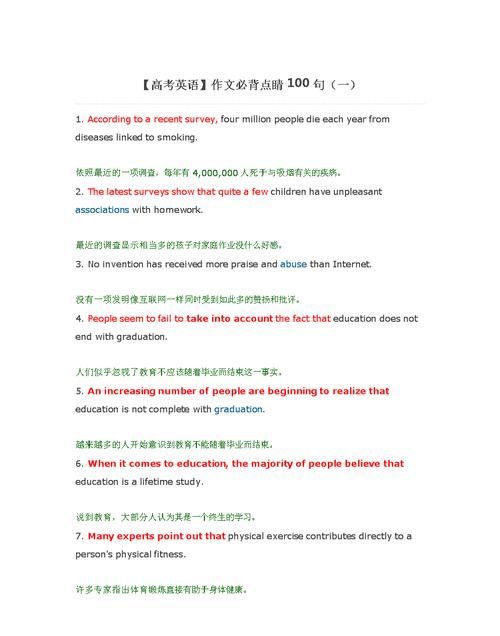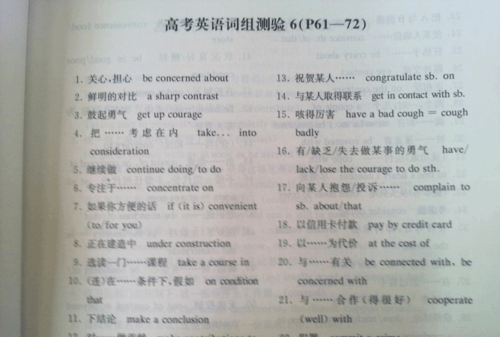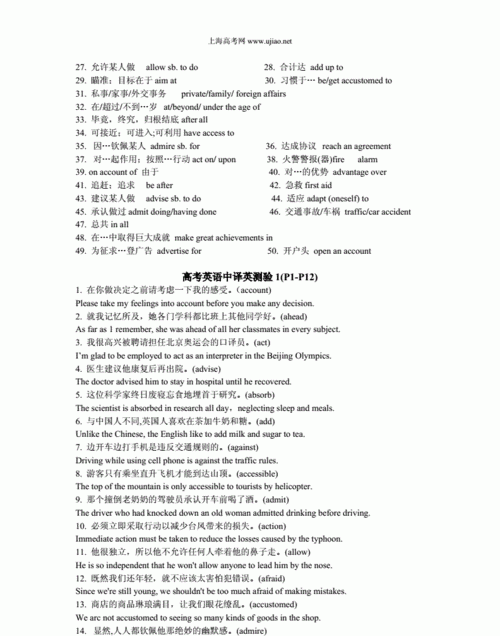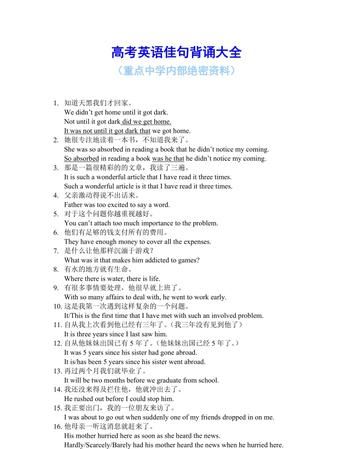本文目录
高考英语常考句型300句
高中英语:高考英语常考60个句型+例句
高中英语入门超级重要的60个句型,附有例句,不爱记语法理论的同学,一定要多背自己不熟悉的句式。
1. as…as 和……一样
中间必须用形容词或副词原级。例如:
This classroom is as big as that one.
这间教室和那间一样大。
He runs as fast as Tom.
他和汤姆跑的一样快。
否定结构:not as/so…as,“不如……”。上面的两个句子可分别改为:
This classroom is not as/so large as that one.
这间教室不如那间大。
He doesn’t run as/so fast as Tom.
他跑得不如汤姆快。
2. as soon as 一……就……
用来引导时间状语从句。若主句是一般将来时,从句要用一般现在时。例如:
I’ll tell him the plan as soon as I see him.
我一看到他就告诉他这个计划。
He’ll go home as soon as he finishes his work.
他一完成工作就回家。
3. be busy/enjoy/hate/go on/finish doing sth. 忙于/喜欢/讨厌/继续/完成做某事
在enjoy, finish, hate, go on, be busy等词语后,一般用动词-ing形式作宾语。例如:
Lin Tao is busy making a model plane.
林涛正忙着做飞机模型。
My mother enjoys taking a walk after supper.
我妈妈喜欢晚饭后散步。
I hate watching Channel Five.
我讨厌看五频道。
When someone asked him to have a rest, he just went on working.
当有人让他休息一会儿时,他仍继续工作。
I have finished writing the story.
我已经写完了故事。
4. fill…with 用……装满......;be filled with 充满了……;be full of 充满了......
①be filled with 说明由外界事物造成的此种状态,表示被动。例如:
The box is filled with food.
盒子里装满了食物。
②be full of说明主语处于的状态。此外,还可表示程度,意为“非常”。例如:
The patient’s room is full of flowers.
那个病人的房间摆满了花。
The young man is full of pride.
那个年轻人非常骄傲。
③这两种结构还可以相互改写。例如:
I fill the box with food. The box is full of food.
5. be good/bad for 有利于/有害于……
此句型是:be+adj.+for+n.结构。例如:
Doing morning exercises is good for your health.
做早操对你的健康有益。
Always playing computer games is bad for your study.
总玩电脑游戏对你的学习不利。
6. be used to(doing) sth. 习惯于……
后必须接名词或动名词,可用于现在、过去、将来的多种时态。be 可用get,become来代替。例如:
He is used to life in the country.(He is used to living in the country.)
他习惯于乡村生活。
He will get used to getting up early.
他将会习惯于早起。
注意:be used to do 的意思是“被用来做……”。例如:
Wood is used to make paper.
木材被用来造纸。
7. both…and…两者都……
用来连接两个并列成分;当连接两个并列主语时,其后谓语动词用复数。例如:
Both the students and the teachers will go to the History Museum tomorrow.
不论老师还是学生明天都会去历史博物馆。
8. can’t help doing sth. 禁不住做某事
help在此的意思是“抑制,忍住”,其后接动词-ing形式。例如:
His joke is too funny. We can’t help laughing.
他的笑话太有趣了,我们禁不止笑了起来。
9. sth. costs sb. some money 某物花费某人多少钱
此句型的主语是物。cost一词带的是双宾语,它的过去式、过去分词和原型一样。
This book cost me five yuan.
这本书花了我五元钱。
10. either…or… 不是……就是……,或者……或者……
用来连接两个并列成分,当连接并列主语时,谓语动词与邻近的主语保持一致。
You may either stay here or go home.
你可以呆在这儿,也可以回家。
Either she or I am right. = Either I or she is right.
不是她对就是我对。
11. enough (for sb.) to do sth. 足够……做……
在此结构中,for用来引出不定式的逻辑主语。例如:
The ice isn’t thick enough for you to walk on.
这冰还没有厚到你可以在上面走的程度。
12. feel like doing sth. 想要做……
此处like为介词,后面跟动词-ing形式。此句型与would like to do sth.同义。例如:
I feel like drinking a cup of milk.
我想喝一杯牛奶。
13. feel/find/think it adj./n. to do sth. 认为某事……
在此结构中it为形式宾语,不定式短语作真正的宾语。例如:
I find it very interesting to play football.
我发现踢足球很有趣。
She thinks it her duty to help us.
她认为帮助我们是她的职责。
14. get ready for sth./to do sth.
get ready for sth.意为“为某事做准备”;get ready to do sth.意为“准备做某事”例如:
We are getting ready for the meeting.
我们正在为会议做准备。
They were getting ready to have a sports meet at that moment.
他们那时正准备开运动会。
15. get/receive/have a letter from 收到……的来信,相当于hear from
Did you receive a letter from John?
你收到约翰的来信了吗?
I got a letter from my brother yesterday.
我昨天收到了我弟弟的一封来信。
16. had better (not) do sth. 最好(别)做某事
had better为情态动词,其后需用动词原形。had better常用缩写,变成’d better,其否定形式是在其后直接加not。例如:
We had better go now. = We’d better go now.
我们最好现在走吧。
You’d better not go out because it is windy.
今天刮风,你最好别出去了。
17. have sth. done 使(某事)完成 (动作由别人完成)
sth.为宾语,done为过去分词作补语。例如:
We had the machine repaired.
我们请人把机器修好了。
注意区分:We have repaired the machine. 我们(自己)已经修好了机器。
18. help sb. (to) do sth./with sth. 帮助某人(做)某事,其中的to可以省略。例如:
I often help my mother with housework.
我常常帮助妈妈做家务。
Would you please help me (to) look up these words?
请你帮助我查查这些词好吗?
19. How do you like……? 你认为……怎么样?与what do you think of …?同义。例如:
How do you like the weather in Beijing?
你认为北京的天气怎么样? 你觉得这部新电影如何?
20. I don’t think/believe that… 我认我/相信……不……
其中的not是对宾语从句进行否定而不是对主句否定(否定前移)。that可省略。例如:
I don’t think it will rain.
我认为天不会下雨。
I don’t believe the girl will come.
我相信那女孩不会来了。
21. It happens that… 碰巧…… 相当于happen to do,例如:
It happened that I heard their secret.
可改写为:I happened to hear their secret
我碰巧听到了他们的秘密。
22. It’s/has been +一段时间+since从句 自从某时起做某件事情已经一段时间了
该句型中since引导的时间状语从句常用一般过去时。例如:
It’s twenty years since he came here.
他来这里已经20年了。
It has been six years since he married Mary.
他和玛丽结婚已经六年了。
23. It is +adj./n. + for sb. to do sth. 做某事对某人来说……
It是形式主语,真正的主语是不定式to do sth。例如:
It’s not easy for us to study English well.
对我们来说学好英语并不容易。
It’s a good idea for us to travel to the south.
去南方旅行对我们来说是个好主意。
24. It’s + adj. + of sb. to do sth.
It是形式主语,to do sth.是真正的主语, 当表语(即形容词)能对逻辑主语描述时,常用介词of,而不用for。例如:
It’s very polite of you to give your seat to old people.
你给老人让座,非常有礼貌。
25. It seems/appears (to sb) that… (在某人看来)好像……
此句中的it是主语,that引导的是表语从句。例如:
It seems that he is lying.
看样子他好像是在撒谎。
It appears to me that he never smiles.
在我看来,他从来没有笑过。
26. It is +数词+metres/kilometers long/wide… ……是多少米(公里)长(宽)
用来表示物体的长(宽,高),如数词大于一,名词要用复数。例如:
It is 20 metres long from this end to that end.
从这端到那端有二十米长。
27. It’s time for sb. to do sth. 是某人干某事的时候了
it是形式主语,真正的主语是动词不定式to do sth. 例如:
It’s time for the child to go to bed.
孩子该睡觉了。
比较下面两种结构:
① It’s time for + n. 例如:
It’s time for school.
②It’s time to do sth. 例如:
It’s time to go to school.
28. It takes sb. some time to do sth. 花费某人多少时间做某事
it是形式主语,真正的主语是动词不定式to do sth。例如:
It takes her fifteen minutes to walk to the bus stop from here.
从这儿走着到公交车站将花费她15分钟。
It took the old man three days to finish the work.
那个老人花了三天时间完成这项工作。
29. keep (on) doing sth. 一直坚持做某事
keep doing sth.一般用于静态动词。keep on doing sth.意为“继续不停地做某事”,一般用于动态动词,但二者的区别并不是很严格,有时可以互换。例如:
Don’t keep on doing such foolish things.
不要再做这样的傻事了。
He kept sitting there all day.
他整天坐在那里。
30. keep…from doing sth. 阻止......做某事
相当于stop…from doing sth., prevent…from doing sth. 在主动句中,stop和prevent后面的from可以省略,但在被动结构中,from不可以省略。例如:
Please keep the children from swimming in the sea.
请别让孩子到海里游泳。
The big noise outside my room stopped me from doing my homework.
屋外巨大的噪音使我不能做作业。
31. keep sb. doing sth. 让某人一直做某事
不可和keep sb.from doing sth.结构混淆。例如:
Why do you keep me waiting for a long time?
你为什么让我等了很长时间?
32. make sb. do sth. 使某人干某事
make意为“使”时,其后要有不带to的动词不定式。例如:
He made me work ten hours a day.
他让我每天工作10小时。
注意:上句如改为被动语态,则work 前的to不能省略。例如:
I was made to work ten hours a day.
33. neither…nor… 既不……也不……
当连接两个并列主语时,谓语动词与邻近的主语取得一致(就进一致原则)。例如:
Neither we nor Jack knows him.
我们和杰克都不认识他。
He neither knows nor cares what happened.
他对发生的事情不闻不问。
34. not…until… 直到……才......
until后可跟名词或从句,表示时间。例如:
He didn’t come until late in the evening.
他直到晚上很迟才来。
He didn’t arrive until the game began.
直到比赛开始他才来。
35. sb. pays money for sth. 某人花钱买某物
此句型主语是人。例如:
I’ve already paid 2,000 yuan for the motor bike.
我已经花了2000元买这辆摩托车。
36. spend time/money on sth./(in)doing sth. 花费(时间、钱)在某事上/做某事
其中in可以省略,通常主语为“人”。例如:
I spent five yuan on this book.
我在这本书上花了五元钱。
I spent two hours (in) doing my homework yesterday.
昨晚我花了两个小时做作业。
37. so…that… 太……以至于……
用于复合句,that引导的是结果状语从句。so是副词,后面应接形容词或副词,如果接名词,应用such。例如:
The ice is so thin that you can’t walk on it.
冰太薄了,你不能在上面走。
He is such a kind man that we all like him.
他是一个非常好的人,我们都很喜欢他。
38. stop to do sth., stop doing sth.
stop to do sth. 意为“停下来去做另一件事”,stop doing sth.意为“停止正在做的事”例如:
You’re too tired. You’d better stop to have a rest.
你们太累了,最好停下来休息一会儿。
The teacher is coming. Let’s stop talking.
老师来了,咱们别说话了。
39. Thank you for doing sth. 感激你做了……
for之后除了加动名词doing外,还可以加名词。例如:
Thank you for giving me the present.
谢谢你给我的礼物。
Thank you for your help. =Thank you for helping me.
谢谢你的帮助。
40. thanks to 多亏……,由于……
thanks后的s不能省略,to是介词。例如:
Thanks to my friend Jim, I’ve worked out this problem.
多亏了我朋友吉姆的帮助,我已经解决了这个问题。
41. There be句型
①在此结构中,there是引导词,在句中不能充当任何成分,也不必翻译出来。句中的主语是某人或某物,谓语动词be要与主语的数保持一致。例如:
There is a man at the door.
门口有一个人。
当主语是由两个或者两者以上的名词充当时,谓语动词be要跟它邻近的那个名词的数一致(就近一致)。例如:
There are two dogs and a cat under the table.
桌下有两只狗和一只猫。
比较:There is a cat and two dogs under the table.
②There be 句型中的be不能用have来代替,但可以用lie(位于,躺),stand(矗立),exist(生存),live(生活)等词来替换。例如:
There stand a lot of tall buildings on both sides of the street.
街道两旁矗立着许多高楼。
There lies lake in front of our school.
我们学校前面有一个湖。
Once there lived a king here.
这儿曾经有一个国王。
There is going to be a sports meeting next week.
下周准备开一个运动会。
there be 的拓展结构:there seem(s)/happen(s) to be…
There seems to be one mistake in spelling.
似乎有一处拼写错误。
There happened to be a ruler here.
这儿碰巧有把尺子。
There seemed to be a lot of people there.
那儿似乎有很多人。
42. The + adj.比较级, the + adj.比较级 越……,越……
此句型表示一方随另一方的变化而变化。例如:
The harder he works, the happier he feels.
他工作越努力,就感到越幸福。
The more, the better.
多多益善。
43. too+adj./adv. +to do sth. 太……以至于不能…….
此句型为简单句,后面的to表示否定含义。例如:
The ice is too thin for you to walk on.
这冰太薄,你不能在上面走。
The bag is too heavy to carry.
这个袋子太重搬不动。
44. used to do sth. 过去常常做某事
used to是情态动词,表示过去的习惯动作或状态,现在已不存在,因此只用于过去时态。例如:
He used to get up early.
他过去总早起。
When I was yong, I used to play tennis very often.
我年轻时经常打网球。
否定形式有两种:didn’t use to;used not to,例如:
He didn’t use to come. = He usedn’t to come.
他过去不常来。
45. what about…? ……怎么样?
后面可接名词、代词、动名词等。与“how about…?”同义。例如:
We have been to Hainan. What about you?
我们去过海南,你呢?
What about going to the park on Sunday?
星期天去公园怎么样?
46. What day/date is it today? 今天星期几(几月几日)?
—What day is it today?
—Sunday.
—What date is it today?
—June 24th.
47. What’s wrong (the matter) with…? ……怎么了?
What’s wrong with you, Madam?
夫人,您怎么了?
You look worried. What’s wrong with you?
你看上去很焦急,出什么事了?
48. Why not do…? 为什么不做……?
谓语动词用原形。与Why don’t you do…?同义。例如:
Why not go to see the film with us?= Why don’t you go to see the film with us?
为什么不和我们一起去看电影呢?
49. would like to do sth. 想做……
后用动词不定式作宾语。例如:
I would like to drink a cup of tea.
我想喝一杯茶。
疑问句式:Would you like (to drink) a cup of tea?
你想喝杯茶吗?
50. adj./adv.比较级 + and adj./adv.比较级 越来越......
若形容词/副词为双音节词及多音节词,则这一结构变为“more and more +形容词/副词”。例如:
It’s getting warmer and warmer.
天气变得越来越暖和了。
The little girl becomes more and more beautiful.
小女孩变得越来越漂亮了。
51. adj.比较级+than
than引导的是典型的比较级句型,表示“一者比另一者……”,其前用形容词或副词的比较级,than从句可以用省略形式。例如:
I know you better than she does.
我比她更了解你。
This house is bigger than that one.
这所房子比那所房子大。
52. though-从句
though引导的是让步状语从句,意思是“虽然……但是……”。但不能和but连用,英语中表达“虽然……,但是……”时,though和but只能用一个。例如:
Though it was snowing, it was not very cold.
虽然下着雪,可并不太冷。
I was late for the last bus though I hurried.
虽然我拼命赶路,还是没搭上最后一班公交车。
We didn’t feel tired though we walked a long way.
虽然我们走了很长的路程,但是并没有感到累。
53. if-从句
If 引导的是条件状语从句,“如果;假如“。如主句用一般将来时,if从句要用一般现在时(主将从现)。例如:
If I go to the Great Wall tomorrow, would you like to come along?
如果明天我去长城,你会和我一起去吗?
If it rains tomorrow, I won’t go.
如果明天下雨,我就不去了。
54. because-从句
引导原因状语从句,“因为”。例如:
He didn’t hear the knocking at the door because he was listening to the radio.
他没有听见敲门声,因为他正在听收音机。
55. so + do/be + 主语
“So + be/助动词/情态动词 + 主语” 表示前面所述内容也适用于另一人或物。be、助动词或情态动词的选择视前面陈述句中谓语动词的时态形式而定。例如:
He likes football and so do I.
他喜欢足球,我也如此。
Jim was playing football just now and so was Tom.
刚才吉姆在踢足球,汤姆也在踢足球。
比较:“So +主语+be/助动词/情态动词.”结构,是用来证实前一句所表达的内容(起强调作用)。be、助动词或情态动词的选择视前面陈述句中谓语动词的时态形式而定。
A: It is very hot today. 今天天气很热。
B: So it is. 确实如此。
56. not only…but also… 不但……而且……
常用来连接语法作用相同的词、短语或句子。连接两个主语时,谓语动词要和紧靠它的主语在人称和数上保持一致。例如:
She likes not only singing but also dancing.
她不但喜欢唱歌,而且喜欢跳舞。
He is not only a good doctor but also a good father.
他不但是个好医生而且是个好爸爸。
Not only I but also he is hoping to go there.
不但我而且他也想去那儿。
57. prefer…to… 喜欢……胜过…...
prefer (doing) sth. to (doing) sth. 意为“两者相比更喜欢(做)其中之一”。在此结构中,to是介词,接名词或动名词,结构中前后所跟成分一样。例如:
He prefers tea to coffee.
茶与咖啡相比,他更喜欢茶。
He prefers doing shopping to going fishing.
购物与钓鱼相比,他更喜欢购物。
58. 感叹句型:What (a/an) + adj. + n. +主语+谓语! How + adj./adv.+ +主语+谓语!
What a clever boy (he is)! =How clever the boy is!
这个男孩儿多聪明啊!
What a wonderful film we saw last night!
昨天晚上我们看的电影多精彩啊!
How lovely the weather is!
天气多好啊!
How hard he works!
他工作多么努力啊!
59. 祈使句型
祈使句型表示命令、请求、劝告等含义。说话的对象通常为第二人称,习惯上常省略。句末用句号或感叹号。肯定祈使句是:谓语动词用动词原形表示。否定祈使句是:在谓语动词前加do not(don’t)。例如:
Be here on time tomorrow.
明天准时到这儿来。
Say it in English!
用英语说!
Don’t be afraid!
别怕!
Don’t look out of the window!
不要朝窗外看!
60. 并列句型
用并列连词连接起来的两个或两个以上的简单句叫并列句。连接并列句常用的连接词有:and, but, or, so, however, not only…but also, neither…nor, either…or…等。例如:
I help her and she helps me.
我帮助她,她帮助我。
He is very old but he is in good health.
他年纪很大了,但他身体很好。
We must hurry, or we’ll be late.
我们得赶快走,不然就晚了。
Kate does her work carefully, so she never makes any mistakes.
凯特工作很认真,从不出错。

高考英语万能句子开头结尾
一.开头句型
1.As far as ...is concerned 就……而言
2.It goes without saying that... 不言而喻,...
3.It can be said with certainty that... 可以肯定地说......
4.As the proverb says, 正如谚语所说的,
5.It has to be noticed that... 它必须注意到,...
6.It's generally recognized that... 它普遍认为...
7.It's likely that ... 这可能是因为...
8.It's hardly that... 这是很难的......
9.It's hardly too much to say that... 它几乎没有太多的说…
10.What calls for special attention is that...需要特别注意的是
11.There's no denying the fact that...毫无疑问,无可否认
12.Nothing is more important than the fact that... 没有什么比这更重要的是…
13.what's far more important is that... 更重要的是…
二.衔接句型
1.A case in point is ... 一个典型的例子是...
2.As is often the case...由于通常情况下...
3.As stated in the previous paragraph 如前段所述
4.But the problem is not so simple. Therefore 然而问题并非如此简单,所以……
5.But it's a pity that... 但遗憾的是…
6.For all that...对于这一切...... In spite of the fact that...尽管事实......
7.Further, we hold opinion that... 此外,我们坚持认为,...
8.However , the difficulty lies in...然而,困难在于…
9.Similarly, we should pay attention to... 同样,我们要注意...
10.not(that)...but(that)...不是,而是
11.In view of the present station.鉴于目前形势
12.As has been mentioned above...正如上面所提到的…
13.In this respect, we may as well (say) 从这个角度上我们可以说
14.However, we have to look at the other side of the coin, that is... 然而我们还得看到事物的另一方面,即 …
三.结尾句型
1.I will conclude by saying... 最后我要说…
2.Therefore, we have the reason to believe that...因此,我们有理由相信…
3.All things considered,总而言之 It may be safely said that...它可以有把握地说......
4.Therefore, in my opinion, it's more advisable...因此,在我看来,更可取的是…
5.From what has been discussed above, we may safely draw the conclusion that….通过以上讨论,我们可以得出结论…
6.The data/statistics/figures lead us to the conclusion that….通过数据我们得到的结论是,....
7.It can be concluded from the discussion that...从中我们可以得出这样的结论
8.From my point of view, it would be better if...在我看来……也许更好
常用于引言段的句型
四,1. Some people think that …. 有些人认为…To be frank, I can not agree with their opinion for the reasons below. 坦率地说,我不能同意他们的意见,理由如下。
2. For years, … has been seen as …, but things are quite different now.多年来,……一直被视为……,但今天的情况有很大的不同。
3. I believe the title statement is valid because…. 我认为这个论点是正确的,因为…
4. I cannot entirely agree with the idea that ….我无法完全同意这一观点的… I believe….
5. My argument for this view goes as follows.我对这个问题的看法如下。
6. Along with the development of…, more and more….随着……的发展,越来越多…
7. There is a long-running debate as to whether….有一个长期运行的辩论,是否…
8. It is commonly/generally/widely/ believed /held/accepted/recognized that….它通常是认为…
9. As far as I am concerned, I completely agree with the former/ the latter.就我而言,我完全同意前者/后者。
10. Before giving my opinion, I think it is essential to look at the argument of both sides.在给出我的观点之前,我想有必要看看双方的论据。
演绎法常用的句型
五,1. There are several reasons for…, but in general, they come down to three major ones.有几个原因……,但一般,他们可以归结为三个主要的。
2. There are many factors that may account for…, but the following are the most typical ones.有许多因素可能占...,但以下是最典型的。
3. Many ways can contribute to solving this problem, but the following ones may be most effective.有很多方法可以解决这个问题,但下面的可能是最有效的。
4. Generally, the advantages can be listed as follows.一般来说,这些优势可以列举如下。

高中英语作文句子摘抄大全
1. 高中英语作文佳句
高中英语作文佳句 1.高考英语作文有哪些万能句子
一般的作文都是以论文,就可以借用 Recently / Nowadays xxx becomes a very heated topic。
Some hold that it is good for (students/ our country等),while others take the opposite position。 Ithink that it has its advantages and disadvantades First,it has many advantages, such as (例如说有那些优点,或者对什么有什么好处等)。
Also, it has many disadvantages (例如说有那些缺点,或者对什么有什么坏处等)。 In a word, xx just like a double-edged sword, both have good effect and bad influence。
So we have to look at it rationally, try to make good use of it and avoid it's disadvantage。 这样套写大部分都可以用,要加的东西要写的好,理由充分的话得个七八成分应该问题不大。
这些已经有7,8十字了,再加上话题换过来,后面的各写20个左右的单词,四级作文字数就绰绰有余了,六级的就要求再高点,后面的写,2,30个左右,也就列举个2,3条理由,这样字数也超过了 当然上面说的有些也可以替换,不过基本结构思路都差不多了。
2.怎样才能把高中英语作文写好
一般说来,学习英语写作有三个步骤,这三个步骤是不能截然分开的.第一,学习这门语言的基本的词汇和语法.此时的学习者对这门外语的基本用法还未掌握,因此尚处于学习语言的基础阶段.这时写作训练一般没有,即使有也只是为练习词汇和语法服务.这种练习一般说来内容都非常简单,强调的是学习者所使用的词汇和语法必须正确.第二,语言和内容并举.此时的学习者已经掌握了该语言的一些基本的词汇和语法,可以用该语言表达自己的简单的思想.这时的写作练习可以达到两个目的:(1)继续增强对语言的掌握;(2)用英语表达一定的思想.在具体的学习实践中,这两者实际上是不可分的.有许多初三的学生开始用英语记日记,其实他们就正处于这一阶段.第三,主要强调内容.当学习者对一门外语的词汇和语法有了一定的掌握,可以用它来表达相对复杂的思想时,就基本进入了第三阶段.此时的语言已经不是最大的障碍,如何写出好的内容成了头等大事.这一阶段的学习者所注重的是如何选材、如何组织文章之类的问题.有人说只有这第三阶段的写作才是真正的写作.这一说法可能失之偏颇,但成功的写作是必须达到这第三阶段的.如果你发觉写出完整的句子尚有困难,这说明你还处于第一阶段.此时你不要急于写出长篇大论,即使你有些想法可能非常深刻.这时你应该做的是注意语言的积累,留意常用词和句型的用法.另外,适当做一些翻译练习也可以帮助你提高运用语言的能力,从而为提高写作能力做好准备.我们的翻译板块中有许多练习实际上对你们的写作能力的提高也是大有裨益的.除此之外,多做一些阅读,培养对语言的感觉也能为提高写作能力做一些准备.因此,你在现阶段可以从以下三个方面着手:积累语言素材、多做翻译练习、多做阅读练习.随着你的语言能力的提高,你会逐步进入第二阶段,到那时你就不愁写不出句子了.。
3.高中英语作文好句
1、I'm looking forward to meeting you in no time.我期待与你早日相见。
2、Nothing is more important than to receive education.没有什么比接受教育更重要的事了。3、There is no doubt that playing video game is going to be their biggest problem for students to affect study.毫无疑问,玩电子游戏正在成为影响学生学习的最大问题。
4、Obviously, it is high/(about) time that we took some effective measures to solve the problem.显然,早该采取一些积极的措施来解决问题。5、I suggest the department concerned taking some effective measures to improve the present situation.我建议有关部门采取一些有效措施改善现状。
6、Since he went to senior high school, he has worked very hard.自从他上高中,他一直很用功。7、We should spare no effort to beautify our environment.我们应该不遗余力的美化我们的环境。
8、Smoking has a great influence on our health.吸烟对我们的健康有很大的影响。9、As a proverb says, /(As is well known to us,) storms make trees take deeper roots.有句名言说道:风暴使树木深深扎根。
10、It is a great honor for me to introduce to you one of my very best friend, Liu Xiang.很荣幸给你介绍我的一位好朋友,刘翔。11、Coming from a family of English teachers, she always had a particular interest in English.出于英语教师世家的她,对英语有着特别的兴趣。
4.高考英语作文怎么写得流畅不要背万能句子或模版.只是个疑问,怎么
根据考纲,英语高考中的书面表达要求考生根据情景,写一篇120-150字的短文.短文不但要有内容描述,还要有观点和感想.其目的主要是考查考生是否能够用所学的英语知识,用合乎英语习惯的表达方式传递信息,进行思想交流.考查形式是图表、文字和图画任选其一.因此,考生要具有连词、组句和谋篇布局的能力,对图表类比、分析的能力和对图画的观察、信息转换的能力. 根据考试说明和评分要求,考生应该做到: 一、切中题意.切题与表达是不可分割的统一体,内容不切题,再好的表达也无济于事.其中,审题是做到切题的第一步.所谓审题就是要看清题意,确定文章的中心思想、主题,并围绕中心思想组织材料. 二、情节信息完整.这里的情节信息,就是书面表达所提供的内容要点,这是短文的核心部分.在提示说明中,有时把情节信息,一、二、三、四逐个列出,当然一目了然,但有时不一定交代得很具体,只给了大致轮廊,这就要求我们自己思考确定,逐条列出,写作时不致漏掉要点.特别是写由几幅图画组成的短文更需要动脑筋,通过现象抓本质,确定每幅画的信息点. 三、语言基本无误.所谓语言无误,包含两层意思,一是用词准确,能充分表达原意.二是语法规范,符合英语习惯.写出来的句子,读起来语感正常,不牵强附会,不生搬硬套,通篇读完,有英语味道.纵使达不到nativespeakers的写作水平,但起码得让人家觉得acceptable.我们写作中最大的毛病是Chinglish(汉语式英语),既糟蹋了英语,又曲解了汉语.下面的句子,貌似正确,其实都是病句: 1.Don't persuade him.He won't listen to you. 2.Why did you against me at the meeting? 3.He promised his daughter to go with him. 4.Is the house belonged to you? 5.My father was only ten when the war was broken out。
5.【求高中英语作文句子组合技巧,比如用状语从句,同位语,定语从
写英语作文的时候,最好的方式是挑简单明了的句子写,用从句写的话一旦运用错误就会扣分,而用简单的句子就不会让老师跳出毛病,自然而然就会避免扣分.这里简单跟楼主介绍一下状语从句,同位语,还有定句从句的区别,仅供参考:状语从句:一般作为先行条件,解释什么样的情况下发生什么样的事情,主要作为“条件”,一般放在句前,也有放在句子后面的,较少.同位语:一般作为解释一个”词“,这个词通常为主语/宾语,也有定语,但是同位语的作用就是用来说明这个主语或者宾语处于什么状态,是什么样子等等.定语从句:很显然,定语从句是用来做形容词的,它通常用来形容主语/宾语/或者一整个句子希望可以帮助楼主。
6.【高中英语作文怎么写我考的是读写任务,就是先用30个词概括短文,
高中的作文目的性比较强,只需要先总结出中文意思,然后翻译就行.但是有个问题就是那个一句中文我们估计得用好几句英文去翻译,有时候甚至还翻译不出来,这就需要平时的积累了.所以平时需要被多记一些句型和短语.我看你上面说的平时写作业的时候用了很多句型,我想知道的是那些是你自己写的还是是你在哪篇文章中看到的然后找到它抄了过来.我上高中的时候每天早上背诵一篇英文短文并且默写,背诵的目的是记住,默写的目的是为了把那些句子变成是自己的.有些东西多背几遍就行,并且要随时复习 直到变成是你自己的话.如果怕记不住我告诉你一个便捷的方法.一天记一个好的句型.然后这周所有的作文都用到它,然后每周复习一次.我想你就可以记住了,彻底把那些句子当成是自己的。

高考作文英语句子模板
高考作文英语常用句子示例:
1. It goes without saying that ...不用说……
It goes without saying that it pays to keep early hours. 不用说, 早睡早起是值得的。
2. There is no denying the fact that ...不可否认这个事实……=No one can deny ...谁也不可否认……
There is no denying that successful business lies in a healthy body and mind. 不可否认, 成功的关键在于健康的身心。
3. I am greatly convinced (that)...=I am greatly assured (that)...我深信……
I am greatly convinced that prevention is better than cure. 我深信预防胜于治疗。
4. Among various kinds of ...=Of all the ...在各种……之中, ……
Among various kinds of sports, I like jogging in particular. 在各种运动中, 我尤其喜欢慢跑。
5. In my opinion ...=As far as I am concerned ,...在我看来, ……
In my opinion, playing computer games not only takes up much time but also is harmful to our health. 在我看来, 打电脑游戏既花费也有害健康。
6. According to my personal experience = Based on my personal experience根据我个人经验
According to my personal experience, smile has done me a lot of good. 根据我个人的经验, 微笑带给我很多好处
7. Of all the people I know, perhaps none deserves my respect more than ...在我认识的人当中, 也许没有一个人比……更值得我尊敬。
Of all the people I know, perhaps none deserves my respect more than Miss Zhang, my English teacher. 在我认识的人当中, 也许没有一个人比我的英语老师张老师更值得我尊敬。
8. In the course of my schooling, I will never forget ...在我的求学过程中, 我忘不了……
In the course of my schooling, I will never forget the great difficulty I encountered in learning English. 在我求学的过程中, 我忘不了学习英语的巨大困难。
9. With the increase/growth of the population, ...随着人口的增加, ……
With the advance of science and technology, ...随着科技的进步, ……
With the rapid development of our economy ,...随着我国经济的快速发展, ……
10. In the age of information and communication, ...plays an important role. 在这信息年代, ……扮演重要的角色。
In the age of information and communication, the computer plays an extremely important role. 在这信息年代, 计算机扮演着非常重要的角色。

以上就是关于高考英语必考默写常考句子 ,高考英语常考句型300句的全部内容,以及高考英语必考默写常考句子 的相关内容,希望能够帮到您。

